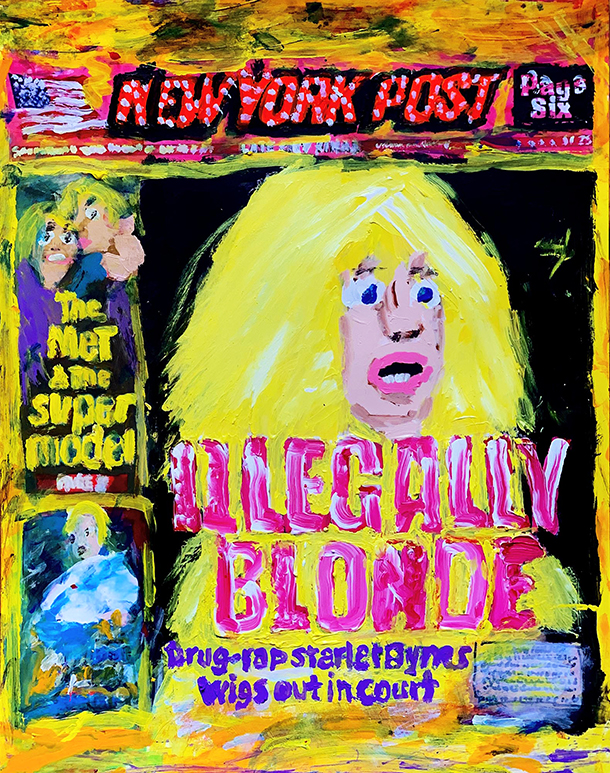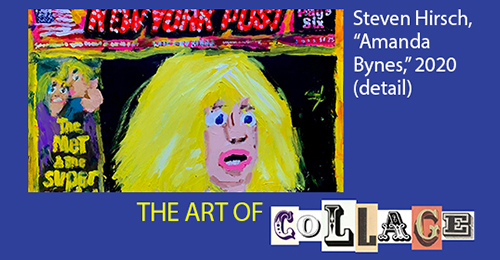
A TABLOID-NEWSPAPER LENSMAN BLENDS MEDIA AND GENRES WITH GUSTO
by Edward M. Gómez
The New York-based photographer and painter Steven Hirsch’s art is all vitality and gusto; to examine his spontaneous street photos, abstract photographic images, or boldly colored pictures, with their vigorous brush strokes, is to sense the high-spiritedness he brings to his irrepressible, ongoing party with his muses.
We first met Hirsch and got to know about this born-and-bred New Yorker’s background in brutjournal’s January 2022 issue. You can find that article here.
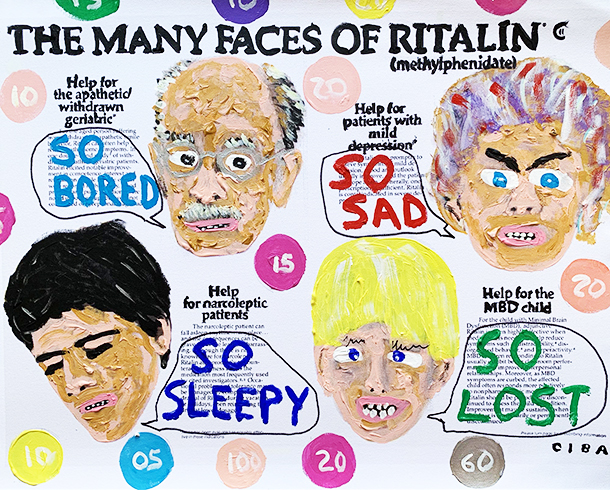
Hirsch grew up in Brooklyn and has spent his professional life working in New York, shooting news photos for tabloid newspapers and often finding among his subjects criminals, oddballs, nomadic youths, and ladies with big hair.
Recently, in conjunction with our research about artists who make collages or who integrate aspects of collage into their mixed-media, genre-bending creations, we caught up with Hirsch and asked him to show us some of the paintings he has been making with this approach in mind.
When and why did Hirsch first begin exploring collage? The artist recalled, “I started making collage-style paintings toward the end of 2018, when I was just starting to paint. I had been a photographer all my life and I had printed thousands of photographs in a traditional darkroom, and then later with desktop printers. So it made sense to me to incorporate photo-based imagery into my first attempts at paintings.”
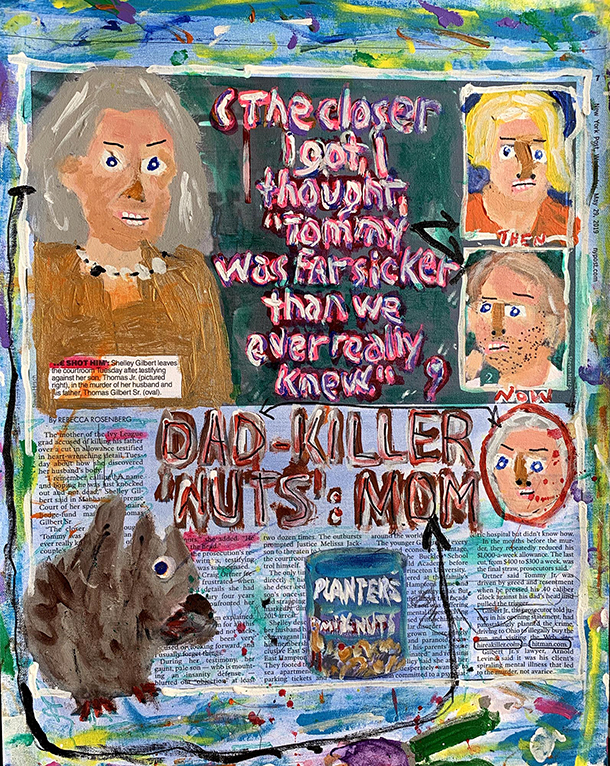
About the technique he developed, Hirsch explained, “I would print photographs on canvas and then paint over them, using the photos to produce a kind of collage without actually gluing images together. I’m self-taught. I had no training as an artist and I just did what came naturally. Traditional collage-making wasn’t something that came to mind, but painting and photography did.”
Often, what might appear unusual or even radical to a viewer when examining what an artist has produced can, as Hirsch suggested, feel instinctive to its creator.
He observed, “I think my non-traditional collages merge the yin and yang of my paintings and my photography; even though they’re completely different media, with very different properties and appearances, from the beginning, I was trying to morph the two together.” In effect, in doing so, Hirsch noted, he was trying to “let go of the photographic process.” He added that, as time passed, and his technical experiments progressed, “my paintings started to evolve into non-photographic imagery, although I still maintained a collage look in many of my them as I moved forward.”
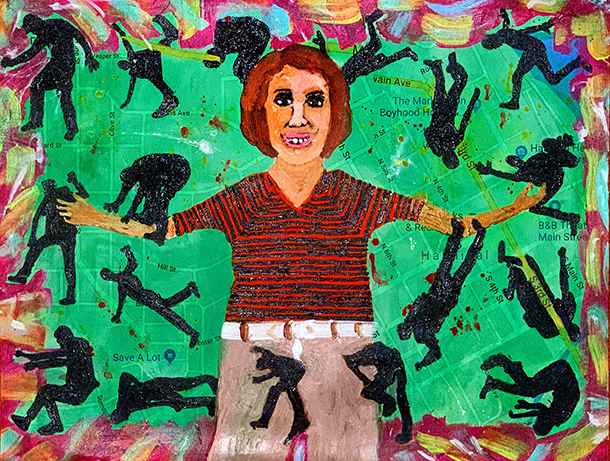
About some of Hirsch’s collage-integrating works, which are reproduced here, the artist observed, “‘The Many Faces of Ritalin’ is from an actual drug advertisement I printed on canvas and painted over. I wanted to incorporate the look of a collage by using the bold contrast and texture of the paint over the black-and-white text of the ad to describe my reaction when I first read it.”
About the picture “‘Daddy-Killer Nuts: Mom’: Tommy Gilbert,” which reproduces a page from a tabloid newspaper, Hirsch noted, “This one is from a news story for which I shot photos of Thomas Gilbert, the Princeton University student who, in 2019, was found guilty of killing his father, because the older man had reduced his son’s weekly allowance of $1000.00. It’s a collage of an actual newspaper report about Gilbert’s trial, with images of its main characters painted over it. I see this piece as capturing the farce and sensationalism of tabloid journalism, bringing it to a whole new level of absurdity that could only be created with paint and a brush.”
He added, “My paintings ‘Sacramento, California’ and ‘Hannibal,Missouri’ portray missing persons over photographic images of maps of the regions in which they vanished. I was interested in the harsh reality of disappearing from the face of the Earth, never to be seen again.”
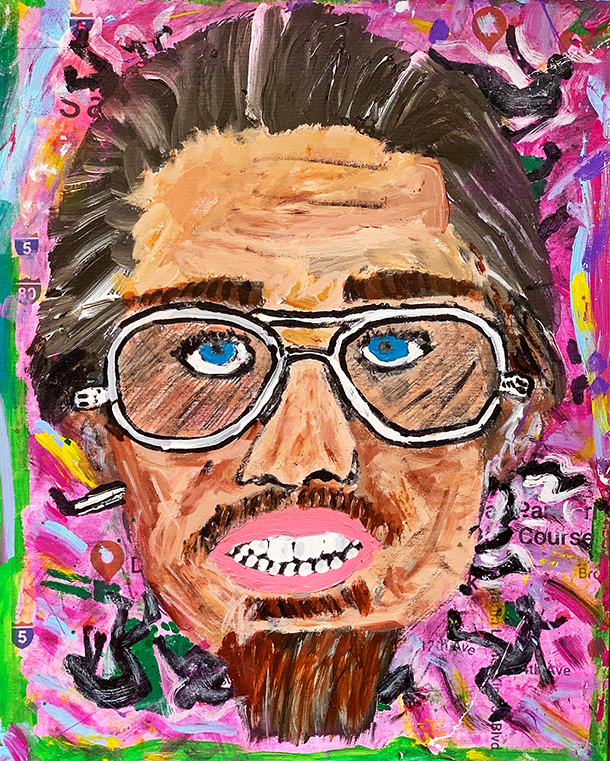
Hirsch seems to intuitively grasp the exuberance of collage. He told us, “For me, making collages is instinctual in the sense that it’s the easiest way to combine ready-made images with the addition of paint and painted words to create pictures with whole new meanings. Maybe that’s why elementary-school teachers use finger painting with collage as a form of artistic expression for children.”
Hirsch is keen on how certain other artists have explored and further developed the genre.
He said, “Contemporary outsider collage artists, such as Anne Marie Grgich and Della Wells, create masterpieces; they take traditional collage to a whole new level, conjuring up new worlds that never existed from the images they find in everyday magazines. I’m sure that, like myself, each of them probably started out as children with a messy bottle of glue, a good pair of scissors — and a vivid imagination.”
Resources
The artist Steven Hirsch’s website can be found here.
Steven Hirsch’s Instagram account: @stevenhirsch
Above, Hirsch refers to the artist Anne Marie Grgich, whose work is also examined in this issue of brutjournal, here.
